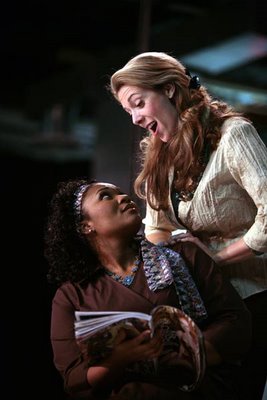Washington National Opera Young Artists, Così Fan Tutte
We welcome this review from Ionarts guest contributor Michael Lodico.
 Aundi Marie Moore and Claudia Huckle as Fiordiligi and Dorabella, Così Fan Tutte, Washington National Opera, photo by Karin Cooper |
The roles of sisters Dorabella (Claudia Huckle) and Fiordiligi (Aundi Marie Moore) were portrayed as fashionable party girls, who at times were chatting on their mobiles, sipping a Starbucks latte, or doing yoga in their gym clothes during the opera. The sisters’ lovers, Ferrando (Greg Warren) and Guglielmo (Trevor Scheunemann) were portrayed traditionally as soldiers pretending to go off to battle, until their disguised return to the stage as lecherous, greasy-haired perverts with the deceitful aim of seducing the other’s lover. This became a highly visual, entertaining, yet unsubtle confrontation between the classic poles of female fidelity and male licentiousness.
One characteristic moment occurred during Act I, when sisters Dorabella and Fiordiligi were passing around a banana while lamenting the worthlessness of all men. Due to the intimacy of the Studio, the capacity audience of 200, who surrounded two sides of the “alley style” stage, could observe the facial expressions, fondling, and excellent acting of the performers. This could well be considered opera buffa in the extreme, due to the level of vulgarity in this production. However, this may be just an attempt to go to the same level as any recent salacious feature film or show on television, which could be in line with the WNO’s aims to reach out to young and diverse audiences.
[Anonymous -- hah!], WNO brightens 'black box' (Washington Times, February 13) Robert Battey, Domingo-Cafritz Young Artist Program (Washington Post, February 16) |
Unfortunately, the performers were done a disservice by having to collaborate with a minimal orchestra – if one could call it so – consisting of string quartet, clarinet, piano, and harpsichord. This left the entire opera top-heavy, with no double-basses or other bass sounds to give the fundamental support necessary to convey the rich harmonic writing of Mozart. For the overture and most of the opera the piano doubled the string parts, which gave the first impression of a high school production. This impression was reinforced by the malfunction of the supertitle monitors for the first 15 minutes of the performance, leaving one in fear of their fate for the following 3 hours. The ensemble was led by Young Artist conductor Benjamin Makino, who largely beat time with both hands identically, with a rather astonishing absence of beat patterns. Fortunately, the singers, with their fine acting facilitated by Andrea Dorf’s effectively kitsch stage direction, saved the day.
Performances -- all sold out -- continue this week (February 11, 14, and 16) at the Washington National Opera Studio (6925 Willow Street NW).





















































2 comments:
Although I personally have no problem with Banana-holding, Banana-peeling, or even Banana-eating on stage, very nicely done. Welcome to Ionarts.
I believe the use of beat patterns is generally overrated. Also I feel some people are obsessed with the question of one or two hand conducting.
Nevertheless good review.
Post a Comment